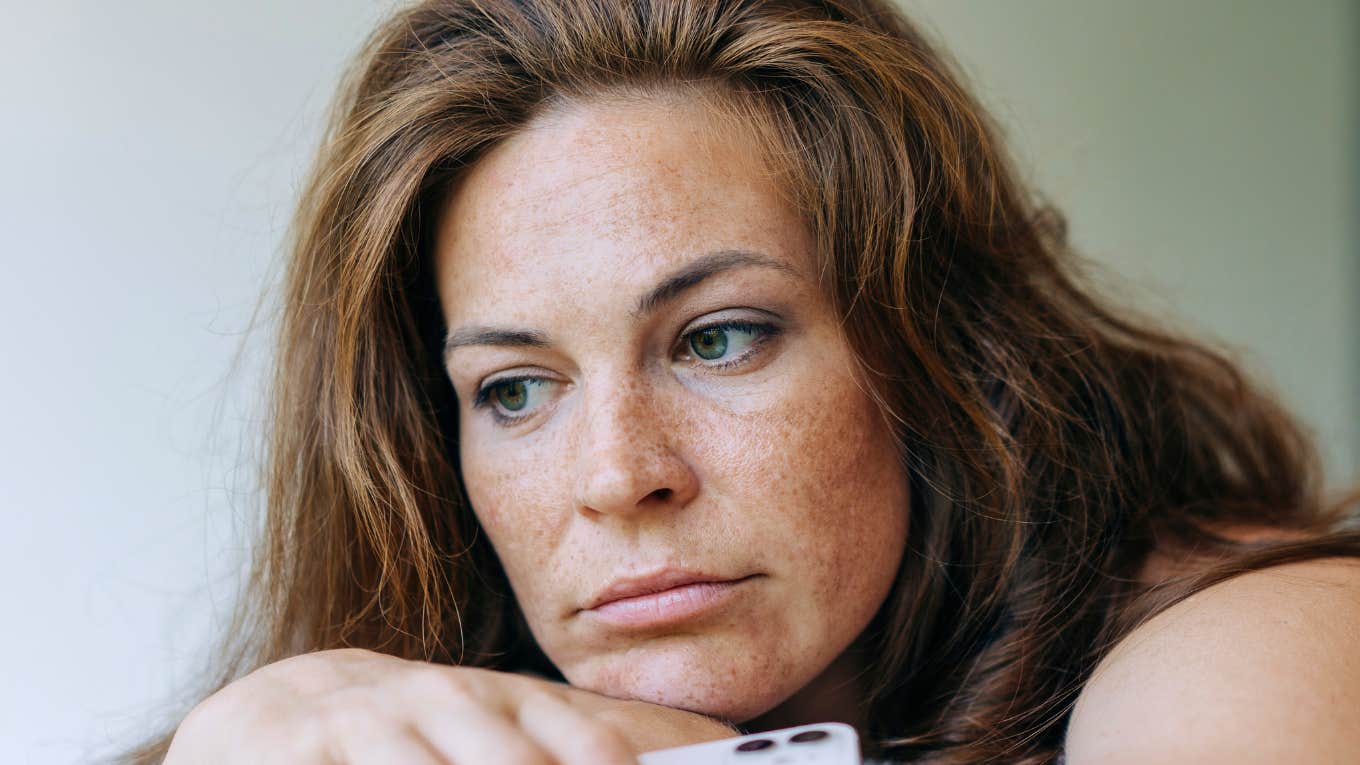5 Adult Habits That Show You Didn't Get The Love You Need From Your Parents
If your parents weren't emotionally available, there's a good chance it's affecting you now.
 Ilona Kozhevnikova / Shutterstock
Ilona Kozhevnikova / Shutterstock The truth is, it’s painful to see all the subtle behaviors that people tend to display when their parents only showed them love when they did whatever their parents asked them to. The kids who grew up on a diet of conditional love didn’t do anything to deserve it. It’s their parents’ fault.
However, that doesn’t mean that they can’t lead fulfilling lives later on. I know because I’ve seen it in a lot of the people I know. It’s not just one little thing. It’s a multitude of things that all build up and pile on. If you're not sure if there are "tells" about your background, let me show you the ones I personally pick up on.
Here are 5 adult habits that show you didn't get the love you need from your parents
1. You're terrified of voicing your opinion or disagreeing with others
Call it "people pleasing" or an anxious attachment style, or what you will. Still, there definitely is a serious connection between being a people-pleaser and having parents who refuse to show affection if you step out of line.
When you are punished with neglect or abuse for being your own person, you quickly learn to just go along with everything that you’re pressured into. You don’t want to raise a fuss because you grew terrified of upsetting others.
To a point, being raised on conditional love may even convince you that your true self isn’t worth loving. (Trust me, it is.)
2. You behave like someone with a 'love addiction'
 Yuri A / Shutterstock
Yuri A / Shutterstock
Not many people realize how much having parents who give you conditional acceptance and love can mess up your mind. When you get that acceptance, it’s oh, so easy to feel like you’re getting a drug high.
There are believe who believe you absolutely can become addicted to love, reassurance, and acceptance when you never really experienced it growing up. The more you feel it, the more you want it, simply because it’s nursing a primal hurt you have.
A lot of the people who had to strive for that next crumb of love end up taking that same cycle into dating. They can’t say no when someone asks to sleep with them, they can’t say no when people pursue them, and they become very vulnerable to love bombing.
As bad as this sounds, I've noticed how many people who grew up with conditional love also tend to cheat as a result of this. Unfortunately, this is one of those things that they have to confront before they can have a truly healthy relationship.
While the idea that being labeled a 'love addict' stems from unmet childhood needs for love and validation is a common belief, research suggests that 'love addiction' is more accurately understood as a manifestation of attachment issues and unhealthy relationship patterns, often rooted in past experiences, rather than a direct consequence of parental love deprivation. Therapy can help individuals explore their attachment styles, address underlying issues, and develop healthier relationship patterns.
3. You have a tendency to overachieve — or you often mention your burnout to friends
I’m going to point out that Show Pony Syndrome and conditional love are basically synonymous in many families. Parents who love conditionally often do so as a way to force their kids to become overachievers or "perfect kids" in the community.
This tends to lead to one of two things. On one hand, you might end up with an overachiever who’s a ball of anxiety and insecurity. On the other hand, you end up with people who are so burnt out that they can’t function without drugs or professional aid.
Conditional love makes you feel like you’re not worthy unless you are outperforming everyone around you. Whether this is the "kabuki dance" of being a socialite or being a Harvard grad doesn’t matter. It hurts all the same.
4. You show signs of borderline personality disorder (BPD)
 fizkes / Shutterstock
fizkes / Shutterstock
Most people don’t want to hear this, but BPD is actually a trauma response. Read that again. If you’ve found yourself loving one person, pushing them away, then questioning why you can’t have a loving relationship, that’s why.
There is no one cause of borderline personality disorder, but in part it happens when you have no sense of security in any of your relationships. You start to try to control your partner and cling to them as a way to try to guarantee yourself stability — even when it sabotages you in the long run.
There’s no real way to skirt the issue. If you see this trait in yourself, you’re going to have to be the one to put in work to rectify it. It’s not easy, but it’s worth it.
While research suggests a link between childhood experiences and the development of BPD, it's crucial to understand that BPD is a complex condition with multiple potential contributing factors, and it's not solely caused by a lack of love or neglect from parents. Therapy can help individuals with BPD develop coping mechanisms and improve their emotional regulation skills, regardless of their childhood experiences.
5. You tend to be way more selfless and loving to others than most
Not many people will have the ability to empathize with others like those who haven’t been shown empathy themselves. They will be the ones who will usually cut others slack, even when it’s actually not good for them to do so. A person who grew up with conditional love knows how it feels to be alone, to be hurt, and to feel rejected by those who are supposed to adore you. They also know what it’s like to not have anyone comfort you in tough times.
Don’t be shocked if you end up with a partner who seems almost superhumanly selfless if your partner grew up in such a household. In a lot of cases, it’s their way of showing the empathy they wish they got themselves to others.
At the end of the day, people who heal from this tend to be the folks who are dead set on making their own chosen family happy and unified. That makes them uniquely amazing friends to have on your side.
Ossiana Tepfenhart is a writer whose work has been featured in Yahoo, BRIDES, Your Daily Dish, Newtheory Magazine, and others.
